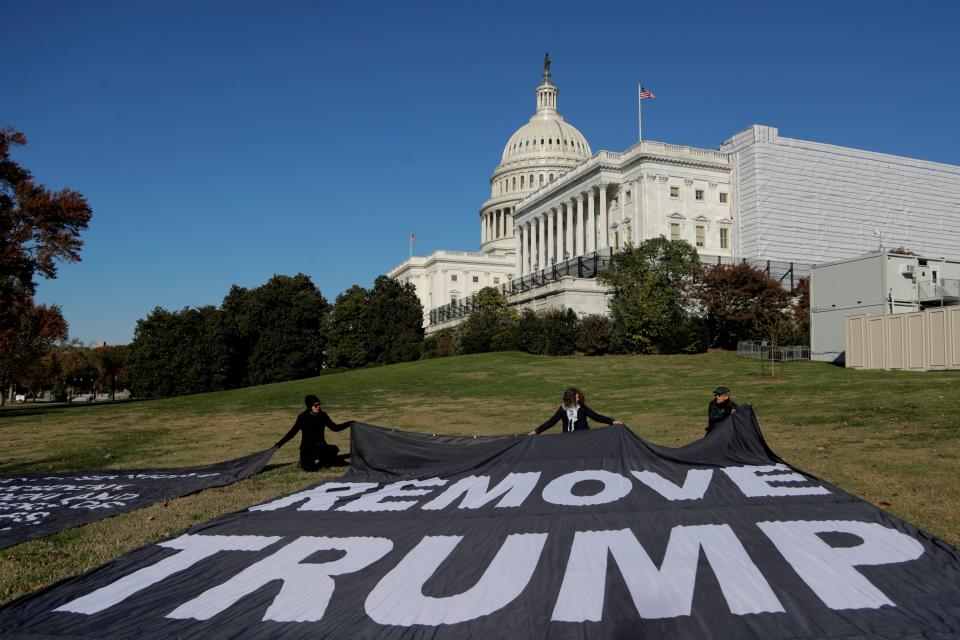In impeachment hearings, Donald Trump is the one blocking firsthand witnesses
The impeachment inquiry into the behavior of President Donald Trump has reached a public phase, giving the American people their first chance to reach their own judgments.
Two witnesses testified Wednesday before a House panel, including one who told of a cellphone call during which the president allegedly pushed to use America’s national security apparatus to do his own political dirty work.
Eight other witnesses have been scheduled. These include the U.S. diplomat on that call with Trump, at least one other person at the table listening in, and a decorated Army officer working for the National Security Council. But many others aren’t coming because the Trump administration is engaged in what could only be categorized as stonewalling.
Undercutting House Republicans
The White House's refusal to provide witnesses, as well as much needed documentation, for a legitimate and serious congressional inquiry accomplishes little but undercut efforts by Republicans to come to Trump's aid.
One of the few coherent arguments that GOP lawmakers could make Wednesday was that the witnesses were sometimes providing secondhand or thirdhand information. All the more reason, then, to go to the source. But several of the key witnesses, including acting chief of staff Mick Mulvaney and former national security adviser John Bolton, are balking.

OTHER VIEWS: Why would we try to be complicit in impeachment inquiry when we don’t know what it’s about
The rationale for the stonewalling is supposedly laid out in a letter White House counsel Pat Cipollone sent to Congress last month. The "due process" argument in that letter, however, has been superseded by events. A vote to authorize the inquiry has been taken, and once-private proceedings are now public.
Much of the rest of the rationale is baffling, unsupported or circular in logic. It declares the inquiry to be invalid because testimony provided by credible witnesses under oath consists of “falsehoods and misinformation.” It declares that Democrats fear they will lose the next election. And it throws in references to the Framers and the Constitution much like a high school student might do in hopes of getting a passing grade on an otherwise incomprehensible term paper.
Refusal could equal impeachable
Surely, if Trump's July 25 phone call with Ukraine's president was as "perfect" as the president says, the administration would want to tell its side of the story.
Topping the list of people who should want to come forward is Mulvaney, who last month publicly affirmed that Trump had conditioned security aid to Ukraine on the announcement of a public investigation into the family of former Vice President Joe Biden. “I have news for everybody,” Mulvaney haughtily declared in the White House briefing room. “Get over it. There’s going to be political influence in foreign policy.”
The fact that Mulvaney later tried to walk back his jaw-dropping admission only adds to the urgency of his testimony. Bolton, meanwhile, has found time to arrange a book contract and deliver paid speeches.
The stonewalling can only contribute to the perception that the administration knows it did wrong and is trying to hide that fact as much as it can. Ultimately, refusal to cooperate with congressional subpoenas might itself be impeachable conduct.
USA TODAY's editorial opinions are decided by its Editorial Board, separate from the news staff. Most editorials are coupled with an opposing view — a unique USA TODAY feature.
To read more editorials, go to the Opinion front page or sign up for the daily Opinion email newsletter. To respond to this editorial, submit a comment to letters@usatoday.com.
If you can't see this reader poll, please refresh your page.
What do you think of our view on White House stonewalling?
This article originally appeared on USA TODAY: In impeachment hearings, Donald Trump blocks firsthand witnesses

